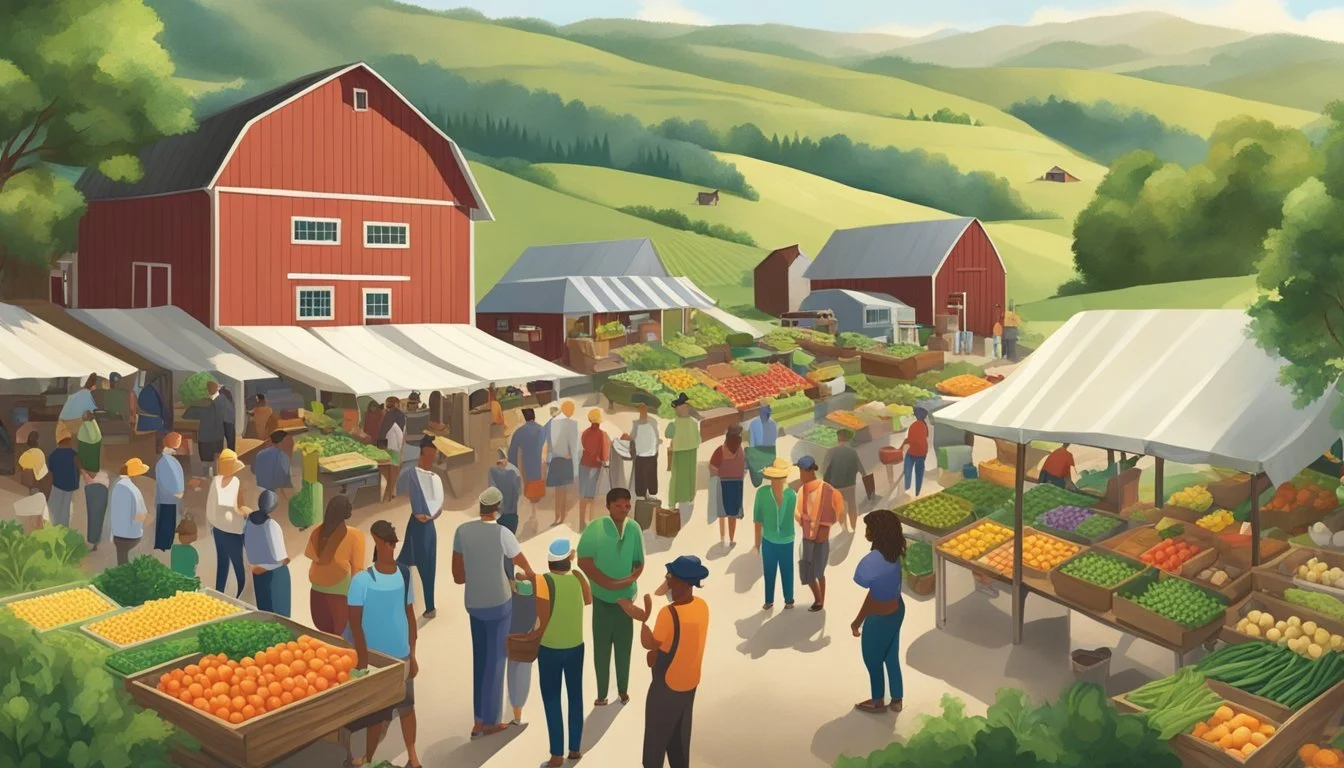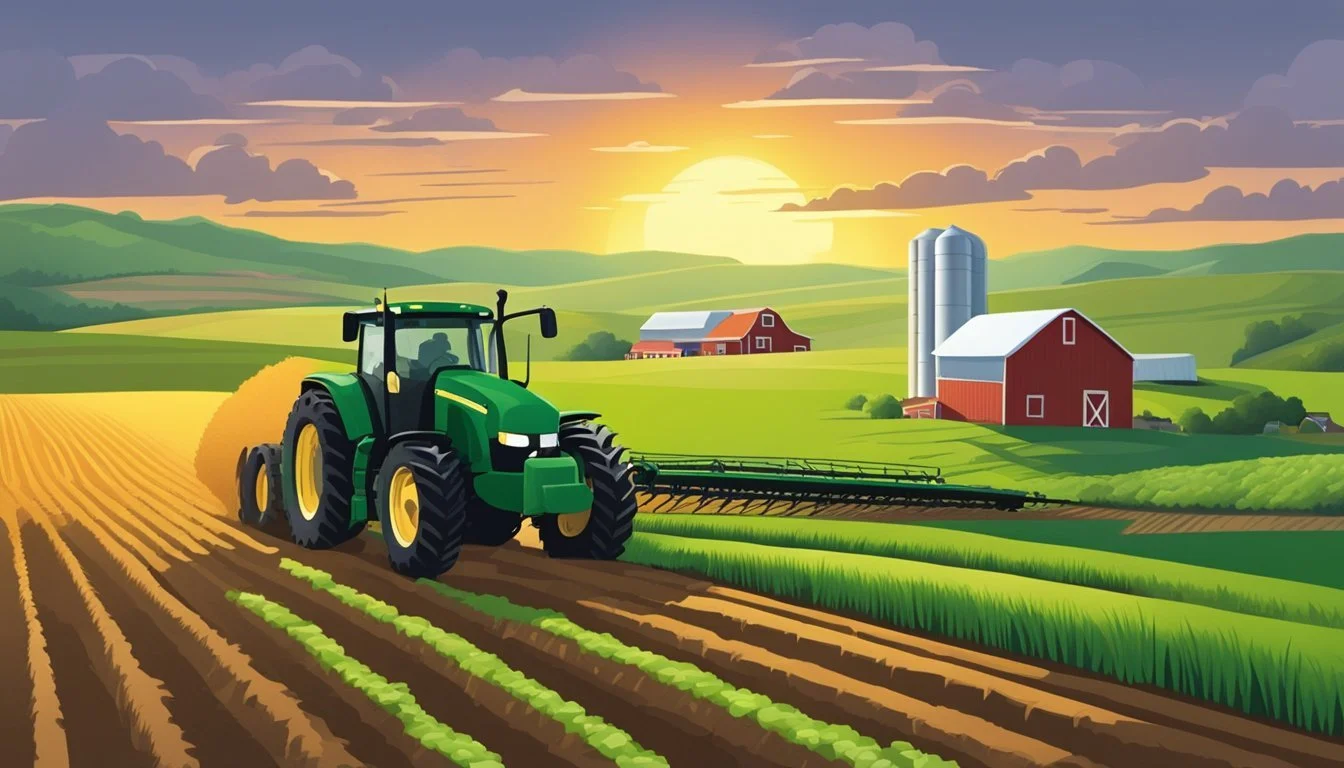Guide to Farming in Michigan
Essential Tips for Successful Harvests
This Article is Part of Our State by State Farming Guide
Michigan stands as a significant contributor to the United States' agricultural output, bolstered by its diverse climate and fertile soil. With an industry that adds billions to the state's economy annually, Michigan's relationship with farming is both historic and multifaceted. Crops range from cherries (how long do cherries last?) and apples to corn and soybeans, (how long do soybeans last?) showing the state's capacity to adapt to various agricultural demands. Livestock, including dairy cattle, represents another cornerstone of Michigan's agricultural prowess, marking the sector as a key economic driver.
In regard to resources and support, Michigan provides numerous avenues for current and aspiring farmers to thrive. Initiatives guided by partnerships between state departments, such as the Michigan Department of Agriculture & Rural Development, and educational institutions offer guidance on land acquisition, credit, and sustainable practices. Such collaborations are vital for fostering a robust farming community equipped with the knowledge and tools necessary for success.
Navigating agricultural endeavors in Michigan involves understanding local regulations and economic conditions. Prospective homesteaders and farmers must be cognizant of zoning ordinances which could influence farm operations. Meanwhile, the cost of land remains an important consideration, with varying prices between cropland and pasture. As the agricultural landscape of Michigan continues to evolve, staying informed on these factors is paramount for anyone looking to delve into the farming industry within this dynamic state.
Understanding Michigan's Agricultural Landscape
Michigan's farmlands and agricultural resources are vital contributors to both state and national economies. Michigan State University plays a crucial role in agricultural innovation and education, supporting a diverse range of farming operations.
Overview of Michigan's Farmland
Michigan boasts approximately 9.7 million acres of land utilized for farming, indicating the state's vast agricultural expanse. Production varies across various operations, highlighting the state's agricultural diversity, with significant contributions from both livestock and field crops. To put this into perspective:
Livestock: Greatest economic impact with $5.13 billion.
Field Crops: Close economic impact with $5.12 billion.
This data underscores the importance of agriculture in Michigan's overall economy.
Role of Michigan State University in Agriculture
Michigan State University (MSU) is a key player in the state's agriculture, offering resources and programs dedicated to the advancement of farming practices and sustainable management of natural resources. The university is involved in cutting-edge research and extends its expertise through the Michigan State University Extension, an outreach arm that fosters public access to informational resources and experts in the field.
Agricultural Education and Programs
Education and support for farmers are paramount in Michigan's agricultural framework. With an array of programs aiming to assist individuals at various stages of their farming careers, Michigan provides comprehensive resources for education and growth. Notable among these is MSU's online tool highlighting resources for beginning farmers, encompassing essential elements such as:
Access to land and credit resources
Information on teaching farms and conferences
These programs are designed to sustainably increase production and maintain the robust nature of Michigan's diverse agriculture industry.
Types of Crops and Livestock in Michigan
Michigan's agriculture is diverse, with a rich variety of crops and livestock. The state is known for its productivity in both plant cultivation and animal husbandry.
Commonly Grown Crops
Michigan's climate and soil composition allows for a wide range of crops. Key crops include:
Corn: A staple in Michigan's crop production, utilized for both feed and ethanol.
Soybeans: Michigan stands as a significant producer, often used for livestock feed and various soy products.
Vegetables: A variety of vegetables like cucumbers, carrots, and squash are grown, catering to both local consumption and larger markets.
Organic Produce: The organic market in Michigan is expanding, with farms producing organic versions of many popular crops.
The state also thrives in specialty crops such as:
Tart Cherries: Michigan is one of the country's leading producers of tart cherries, with vineyards contributing substantially to this output.
Vineyards: Not only cherries but also grapes for wine production are significant, reflecting the growth of Michigan's viniculture.
Livestock Farming Practices
Livestock production is another critical aspect of Michigan's agriculture, with farms adhering to both traditional and modern practices to ensure sustainability and efficiency. Livestock species typically include:
Cattle: For both dairy and beef, cattle farming is integral, with facilities ranging from small family-run farms to larger operations.
Overall, Michigan's farming landscape is characterized by its capacity to produce a broad spectrum of both crops and livestock, forming a critical part of the state's economy and cultural heritage.
Organic and Sustainable Farming
In Michigan, the farming community is increasingly turning toward practices that support environmental sustainability and health-conscious production. Organic and sustainable farming emphasizes the conservation of natural resources, the use of natural fertilizers, and the avoidance of synthetic hormones and pesticides.
Adopting Sustainable Methods
Farmers in Michigan who implement sustainable practices focus on crop diversity and soil health. Sustainable methods include:
Crop Rotation: Reduces the reliance on chemical fertilizers and helps prevent soil depletion.
Conservation Tillage: Limits soil erosion and preserves natural soil structure.
Integrated Pest Management: Utilizes natural means to control pests, reducing the need for synthetic pesticides.
These practices aim not only to protect the environment but also to produce food in a way that is healthier for consumers and maintains the integrity of the local ecosystem.
Organic Certification in Michigan
Michigan farmers who seek organic certification must adhere to strict guidelines that uphold standards for organic production. The process involves:
Creating an Organic Plan: Detailing strategies for building organic matter and ensuring continuous soil coverage with crops.
Maintaining Records: Proving that organic practices abide by the regulations set forth by the certifying body.
Certification: Through a USDA-approved certifying agency, farmers undergo inspection and approval to label their products as organic.
Organic certification is a rigorous process that assures consumers of a product's adherence to defined organic principles, fostering trust in the agricultural system and supporting the health of the community and the land.
Technology and Research in Agriculture
Technological advancements and research initiatives are propelling Michigan's agricultural sector into the future. These developments focus on increasing efficiency, promoting sustainability, and addressing the industry's pertinent challenges.
Innovations in Farming
Michigan has taken significant strides to foster agricultural innovations, particularly through the establishment of the Farm Innovation Program. It specifically targets the development of automated technologies for agricultural production and food processing, showcasing a strong commitment to modernizing farming practices. Initiatives that enhance rural resiliency receive additional consideration, recognizing their critical role in the advancement of farm innovation.
Technological Implementations:
Usage of GPS and GIS technologies to identify and analyze field variability
Adoption of sensing technology for cost-effective data collection on crop health and input requirements
Research Contributions by MSU
Michigan State University (MSU) plays a pivotal role in connecting research to practical farming applications. MSU researchers have initiated programs that deploy precision agriculture techniques, such as low-cost sensor monitoring systems designed to aid the Great Lakes farmers. This underscores MSU's instrumental contribution to transforming research into tangible benefits for the agriculture community.
Key Areas of MSU Research Focus:
Enhancements in soil health
Development of ecological pest management solutions
Integration of organic production methods
Exploration of farm-to-table dynamics
Extension of growing seasons
MSU's continued effort to bridge innovative research with farmer needs solidifies Michigan's reputation as a leader in the agricultural sector's technological and research advancements.
Agricultural Economics
Michigan’s agricultural sector is a significant component of the state's economy, with a diverse portfolio of commodities ranging from livestock to crops. The state stands as a testament to how agriculture can be both economically vibrant and varied.
Economic Impact of Michigan Agriculture
Michigan agriculture contributes $104.7 billion annually to the state's economy. The sector's strongest economic players include livestock (including dairy), generating $5.13 billion, closely tailed by field crops, which bring in an economic impact of $5.12 billion. The state's agricultural economy benefits from its robust agribusiness infrastructure, which includes food processing and distribution networks critical for both domestic supply and international trade.
Livestock & Dairy: $5.13 billion
Field Crops: $5.12 billion
Total Contribution: $104.7 billion
Agricultural Exports and Markets
Michigan's agricultural exports are a vital part of its economy. Key markets for products include Canada, Mexico, China, South Korea, and Japan. These exports range from primary commodities to value-added products. The state's proximity to the Canadian market and its well-established trade relationships make Canada a leading export destination for Michigan's agricultural goods. Other top markets like Mexico, China, South Korea, and Japan are important for the state's diverse commodities, which exceed 300 types, such as:
Apples
Blueberries
Tart cherries
Dairy
Corn
Soybeans
With an extensive array of commodities, Michigan ensures a strong presence in both national and international markets, supporting the livelihood of farmers and contributing to the state's economic resilience.
Farmers Markets and Direct Sales
In Michigan, farmers markets and direct sales channels have become instrumental in connecting consumers with local produce, enhancing food security, and supporting the local economy.
Benefits of Local Produce
Local produce in Michigan offers substantial benefits to both consumers and producers. Consumers gain access to fresh, nutrient-rich fruits and vegetables with a reduced carbon footprint due to shorter transportation distances. For producers, direct sales through farmers markets or other direct consumer channels can increase farm income and create jobs in the local economy. In Michigan, initiating shifts towards more local produce purchasing can potentially increase net farm income by a significant margin, as seen in economic studies.
Freshness and Quality: Local produce is often fresher, having been picked within 24 hours of sale.
Economic Impact: Direct sales can increase farm revenue and support more jobs in the community.
U-Pick Farms and Farm Markets
U-Pick farms and on-farm markets provide unique opportunities for customers to engage directly with their food source. These farms allow individuals to pick their own fruits and vegetables, offering an interactive farm-to-table experience. Michigan farm markets operate with compliance to the Michigan Food Law, ensuring the safety and quality of the agricultural products sold.
U-Pick Farms: These promote transparency and serve as an educational tool on where and how food is grown.
Farm Markets: Local ordinances and Michigan Food Law guide the operation of these markets, focusing on offering safe and high-quality produce directly to consumers.
Agritourism in Michigan
Michigan's diverse agricultural landscape provides a robust platform for agritourism activities, carving a niche that benefits both farmers and visitors. It melds agriculture and tourism to create immersive experiences that range from educational farm visits to recreational activities.
Farm Attractions
Farm attractions in Michigan are varied and abundant. They offer numerous hands-on opportunities for families, students, and tourists to engage directly with farming life. Popular activities include:
U-Pick Farms: Visitors can pick their own fruits and vegetables, with options throughout the year, from apples and cherries to pumpkins and berries.
Corn Mazes: These are particularly popular in the fall and cater to families and groups looking for fun in the intricate patterns carved out of vast cornfields.
Petting Farms: These enable close encounters with farm animals, educating visitors about different breeds and farm animal care.
Wineries: Michigan wineries provide tastings and tours, showcasing local viticulture and the art of winemaking in regions known for their exquisite terroirs.
Cider Mills: A visit to a cider mill is a quintessential Michigan experience in the autumn, often coupled with doughnuts and hayrides.
Agritourism's Contribution to the Local Economy
Agritourism has significant impacts on Michigan's local economies by:
Generating Additional Income: Farms diversify revenue streams by integrating tourism with their traditional farming operations.
Promoting Education and Preservation: Agritourism serves as a platform to educate the public on agricultural practices and the importance of preserving farmlands.
Supporting Farm-Retail: The sale of fresh produce, homemade goods, and crafts at farm stands and markets stimulates the local economy and reduces the food supply chain's carbon footprint.
Agritourism intertwines with various aspects of Michigan's agricultural sector, from ranches hosting events to educational tours at local farms, each contributing to the state's economic and cultural landscape.
Starting a Farm in Michigan
When initiating a farm in Michigan, new farmers need to consider several critical factors, including seeking guidance through available resources and understanding the process of obtaining land and funding.
Resources for New Farmers
Beginning farmers in Michigan have a wealth of resources at their disposal. Key programs like the Michigan Agriculture Environmental Assurance Program (MAEAP) offer guidance in effective land stewardship practices. Farmers can also tap into networks like the Michigan State University Extension service for educational events and tailored advice. Potential farmers should explore these contacts for comprehensive understanding:
Educational Resources: Workshops, online courses, and mentoring provided through institutions like the College of Agriculture and Natural Resources help new farmers gain the necessary skills.
Networking: Farmers can connect with experienced mentors and other farmers through local commodity groups and conservation organizations.
For specific inquiries, individuals can directly reach out via email or look for relevant links on the official extensions or program websites.
Acquiring Land and Funding
Acquiring land and securing funding are two of the most substantial challenges for new farmers. Options to consider include:
Land Purchase: Identify acreage suited for agricultural pursuits through Michigan's real estate listings, keeping in mind the property's soil health and access to markets.
Leasing: An alternative to purchasing, land leasing can be a cost-effective start.
In terms of funding:
Loans and Credit: Traditional bank loans and credit lines can provide necessary capital. Additionally, government programs often offer loans with favorable terms to new farmers.
Grants: Farmers can seek out grants from both governmental and private sources aimed at supporting agricultural businesses.
New farmers should carefully research each option to find the most viable financial path forward. Organizations such as the Michigan Department of Agriculture & Rural Development can offer further assistance and guidance on these matters.
Regulations and Legal Framework
In Michigan, farming is supported by a robust legal foundation that safeguards farmers and sets standards for agricultural production. This framework is critical for anyone involved in farming or produce-related industries.
Agricultural Laws and Policies
The cornerstone of Michigan's agricultural legal framework is the Right-to-Farm Act of 1981, which is designed to protect farmers from nuisance lawsuits related to sight or sound as long as they adhere to the Generally Accepted Agricultural and Management Practices (GAAMPs). Farmers are required to follow these practices to qualify for the Act's protections. The Act seeks to strike a balance by supporting agricultural endeavors while also considering neighbors' rights and land use conflicts.
Key Agencies:
Michigan Department of Agriculture & Rural Development (MDARD): Oversee regulations.
Environmental Stewardship Division: Manages practices impacting environment.
Pesticide and Plant Pest Management Division: Ensures safe pesticide use.
Each division within MDARD has a set of specific, detailed regulations that Michigan farmers must follow to remain compliant with state standards.
Food Safety and Standards
Michigan's food safety and standards are managed by several entities to ensure that food products meet stringent safety requirements. The Food & Dairy Division is especially significant, enforcing regulations that impact both producers and consumers.
Key Regulations:
Food Code: Governs handling and preparation to prevent contamination.
Dairy Industry Laws: Specific to dairy product safety and handling standards.
These food-related laws are comprehensive and necessary for maintaining public health. They apply to a variety of foods, including produce, animal products, and other foodstuffs. Compliance with these regulations is closely monitored, and entities operating within food production are expected to keep abreast of any changes and updates to these legal standards.
Community and Education
Michigan's thriving agricultural sector not only powers its economy but also fosters a strong sense of community and places a high emphasis on education. By integrating agricultural education within schools and providing resources for all ages, the state ensures a knowledgeable, proactive community that upholds its proud farming heritage.
Cooperative Extension Services
Michigan State University (MSU) Extension is a key resource for Michigan farmers and the greater community, offering a wealth of information and services. Through county-based offices, MSU Extension provides research-based educational programs that empower farmers with cutting-edge agricultural practices, land management strategies, and business planning.
Services offered by MSU Extension include:
Sustainable land management techniques
Crop management and optimization
Livestock care and health
Business and financial planning resources
Soil testing and nutrient management guidance
Pest and weed control strategies
Youth and Adult Farming Education
Michigan places significant emphasis on agricultural education for both youths and adults. Schools and organizations across the state integrate agriculture into curricula to meet state and national educational standards through subjects like science, technology, engineering, and math (STEM).
Key initiatives include:
Agriculture in the Classroom: This program enriches K-12 education by incorporating agricultural concepts into classroom learning.
4-H Clubs: They offer a diverse range of agricultural learning experiences, helping to cultivate the next generation's interest in farming.
FFA Organization: Offers an educational platform for high school students, promoting leadership, personal growth, and career success through agricultural education.
Adult Education Programs: These consist of workshops, conferences, and farm tours aimed at adults looking to expand their agricultural knowledge.
Each initiative encourages community participation and provides avenues for both the youth and adult members of the farming community to advance their skills and knowledge, ensuring the enduring success of Michigan's agriculture.
Challenges in Michigan's Agriculture
Michigan's agriculture sector faces a set of unique challenges that impact both the environmental sustainability of farming practices and the economic viability of the industry.
Environmental Concerns
Michigan farmers contend with various environmental factors that affect their livelihood. The state's climate has been exhibiting more extremes, such as flooding and drought, which lead to a host of problems for crop and livestock production. Climate change has introduced new pests and diseases, making crop management more difficult and increasing the need for a robust Agricultural Climate Resiliency Program. Furthermore, these environmental changes are prompting a re-evaluation of water usage, soil management, and ecological conservation practices among Michigan's agricultural community.
Market and Production Challenges
The agriculture industry is also subject to market fluctuations which create financial uncertainties. Key points regarding this challenge include:
The cost of agricultural inputs has escalated recently, with items such as fertilizer prices more than doubling since late 2020.
Family-owned farms, which form the backbone of Michigan's agricultural sector, face additional hurdles in financing and operating amidst these market changes.
Agricultural commodities are highly susceptible to changes in both domestic and international markets, requiring Michigan's farmers to adapt rapidly to remain competitive.
This combination of environmental concerns and market vulnerabilities makes farming in Michigan a complex and high-stakes endeavor.
Conclusion
Michigan's agricultural sector presents a multitude of opportunities for both established and beginning farmers. The state not only boasts a diverse range of profitable crops but also contributes significantly to its economy with $104.7 billion annually. Key players in this economic contribution include livestock and dairy, field crops, and nursery and landscape production.
The state is equipped with support resources for farmers, highlighted by Michigan State University Extension services, where experts are readily available to provide assistance. Additionally, the importance of sustainable agriculture is recognized, with environmental stewardship intertwined with farming practices.
Employment in agriculture is a pillar of the state's workforce, engaging over 920,000 residents in various capacities. Michigan's pioneering role in educational resources for the agricultural community is also commendable, with Michigan State University leading as the nation's pioneer land-grant university.
Farmers in Michigan have access to a wide array of programs that address land acquisition, credit facilities, and continuous professional development. The impact of these resources is evident in the robust infrastructure and the vibrant community of farmers dedicated to feeding the state and beyond.
In summary, Michigan offers a formidable environment for agriculture with its rich soil, favorable climate, and strong market demand for its products. The state’s commitment to the agriculture sector is evident through economic contribution, employment, educational resources, and a focus on sustainability.











